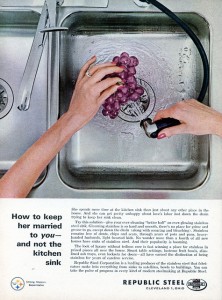Mad Men Enters the Civil Rights Era
Posted on March 25, 2012 at 8:00 am
From the New York Times:
There was no question that “Mad Men” would get around to the civil rights movement. From the start, racism was the carbon monoxide of the show: a poison that couldn’t always be detected over the pungent scent of cigarettes, sexism, anti-Semitism, alcoholism, homophobia and adultery, but that sooner or later was bound to turn noxious.
That promise was made in the opening scene of the premiere episode of Season 1. The first face on screen is a black one in profile, that of a waiter carrying a tray of cocktails across a bar crowded with white, mostly male customers. The camera closes in on Don Draper (Jon Hamm), scribbling ideas on a napkin for a Lucky Strike campaign. Asking for a light, he notices that the busboy, an older black man, smokes Old Gold, and Don asks him why he is so loyal to that brand.
“Is Sam here bothering you?” a white bartender interjects before the busboy has uttered a word. Shooting the black man a warning look, the bartender tells Don, “He can be a little chatty.”
It was the dawn of the 1960s, and that kind of humiliation was so commonplace that both Don and the busboy shrug it off.
What I find especially interesting about this is that, contrary to most depictions of the racism of the era, there is no attempt to portray the white characters as aware of or concerned about the casually bigoted arrogance of the time. Don Draper is only interested in how to help his clients. But I suppose that reflects an element of self-interest that played a role in the era’s changes as well.


